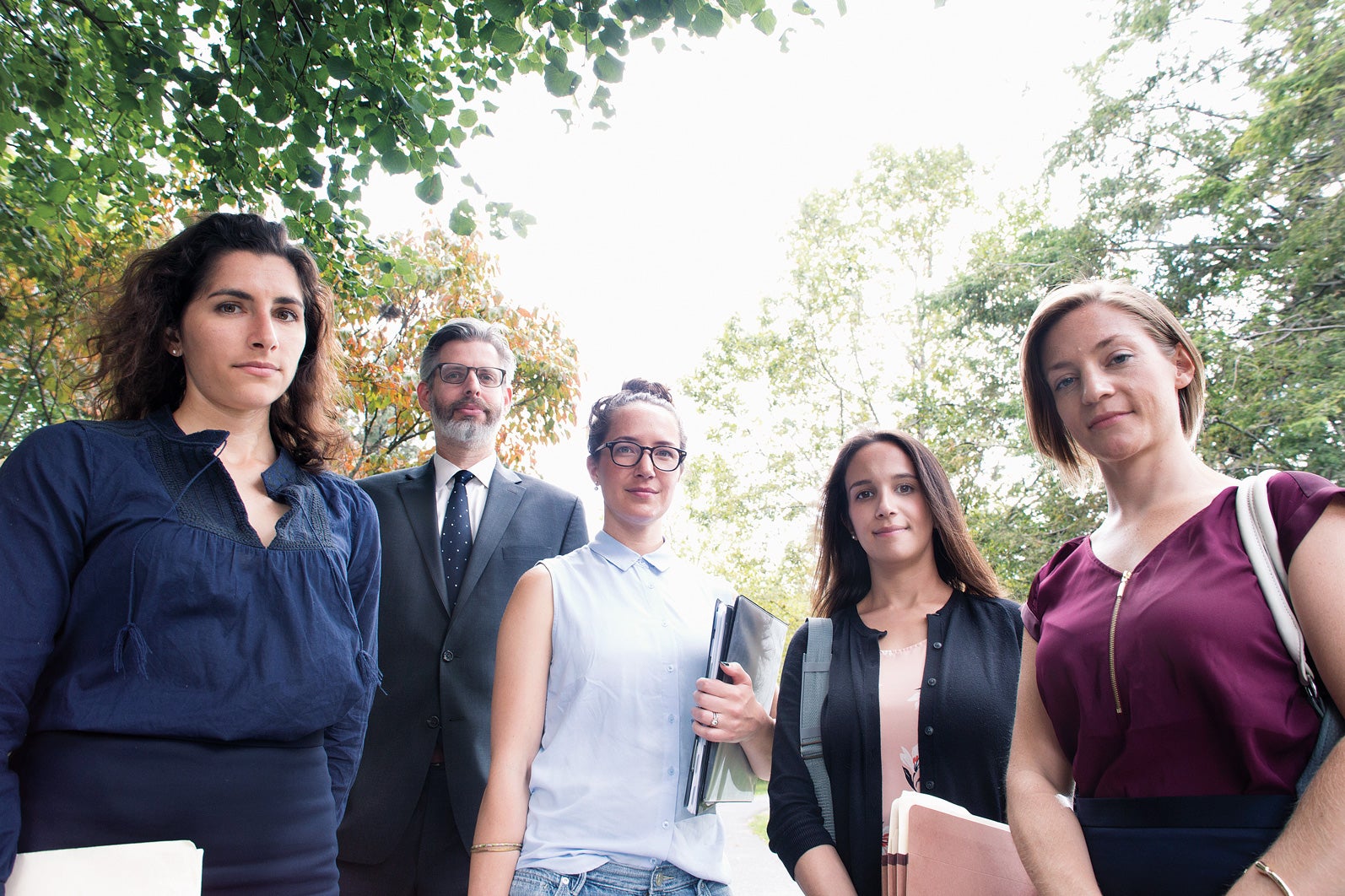The challenge came two years ago: A U.S. Marine Corps veteran needed help. She’d been sexually assaulted by another Marine in the late 1960s. Decades later, she told VA officials, who didn’t believe her story and denied her disability compensation to help treat her post-traumatic stress. Could Harvard Law School’s Legal Services Center help?
Since then, students and staff at the center’s Veterans Legal Clinic have rallied behind her case and scored a key victory on her behalf. It’s part of a growing area of practice for the 4-year-old clinic. Military sexual trauma—rape or sexual harassment during military service—is a fast-emerging issue in the nation’s care for veterans.
Military sexual trauma—rape or sexual harassment during military service—is a fast-emerging issue in the nation’s care for veterans and one focus of an HLS clinic.
“It’s exactly the kind of case you want to work on,” says Harvard Law student Maile Yeats-Rowe ’17, an Army veteran who served in Afghanistan and Kuwait. “It’s a case where we can make a real difference, and maybe move the needle on how the VA sees this.”
The Veterans Legal Clinic was founded to deal with the special problems of low-income veterans and to help bridge the nation’s military-civilian divide.
“Before long, we started to get some cases involving veterans whose military careers were cut short by military sexual trauma and who kept on hitting barriers as they tried to get the help they needed,” says Dan Nagin, faculty director of the Veterans Legal Clinic and the Legal Services Center.
The veterans clinic took its first case involving military sexual trauma two years ago. Now it’s an issue in about 10 percent of its cases. That surge reflects the effects of the Iraq and Afghanistan wars, the growing number of women in the military, and a greater awareness of the once-hidden problem.
Often, the clinic helps victims of military sexual assault or harassment who’ve been diagnosed with PTSD apply for disability compensation. In other cases, the clinic petitions to change a veteran’s discharge status to address the ways military sexual trauma hurt his or her service career. Though women make up a smaller percentage of the armed services, they are disproportionately more likely to be sexually assaulted or harassed. In the military, there are significant numbers of both male and female victims, says Senior Clinical Fellow Dana Montalto.

Montalto is representing a male veteran who was sexually assaulted and persistently harassed by a fellow service member. She says her client began drinking heavily to cope with memories of the trauma and was sent to alcohol rehab. “After not being able to complete the rehabilitation program, and getting into some drinking-related misconduct, he was separated with an other-than-honorable discharge,” Montalto says. “We have been trying to get that changed, now that he is getting more treatment and support, and is more able to talk about it.” The veteran’s application is pending before a discharge review board.
Often, the clinic faces legal battles over a client’s credibility. “In some ways, working on these cases is like working in the criminal justice system, trying to prove a sexual assault occurred,” says Nagin. In other ways, it’s even tougher. Yeats-Rowe says the VA has “a tremendous amount of discretion” in deciding whether a veteran alleging sexual assault is credible. Reviewing officers sometimes review evidence that would be barred in civilian courts, such as a veteran’s medical or sexual history.
Yet the clinic also has a recent legal precedent on its side in military sexual trauma cases. In 2013, a federal appeals court ruled that the absence of an official record of a military sexual assault can’t be treated as evidence that the assault didn’t occur. That helps in cases where a client wasn’t ready to come forward at first, or did report the assault soon after but was not taken seriously. “Our students are really skilled in marshaling that case to maximum effect,” Nagin says.
The precedent helps the female Marine Corps veteran from the 1960s. She reported the sexual assault to her supervisor at the time, according to Nagin, but the supervisor ignored her complaint and made no record of it.
Two teams of law students have worked on her case. Last fall, the clinic filed a brief on her behalf with a federal court for veterans’ claims, arguing the VA erred when it found the client not credible. In response, a VA attorney agreed to remand the case to a VA appeals board for reconsideration—a major victory for the veteran and the clinic.
Yeats-Rowe and her partner on the case, Liz Petow ’17, say the case has helped them hone several skills they’ll need as lawyers, from writing a persuasive brief to finding experts whose research supports their case. They’ve also learned about navigating client relationships. At the female Marine Corps veteran’s rehearing, they’ll be able to introduce new evidence. So in the spring, they spoke with her several times by phone about the assault and its aftermath—a story she hasn’t shared with many people.
“That’s a whole new aspect of what it is to be a lawyer,” says Yeats-Rowe, “how to engage with a client in a way that’s sensitive and caring, but also gets out the information you need to help support the case.”
Both students have returned to the clinic this fall for a third semester.
“We wanted to come back and help her see the case through,” Petow says.
